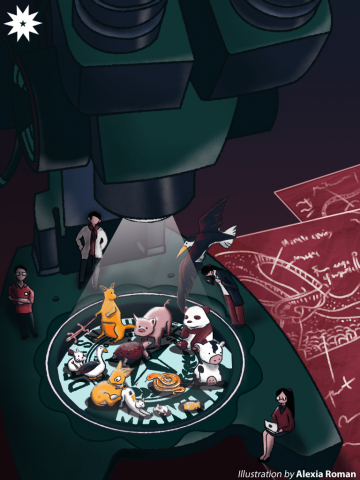New opportunities are brewing in the College of Science. This academic year, the University opened the Bachelor of Science in Animal Biology (BSAB) – Doctor of Veterinary Medicine (DVM) program for aspiring veterinarians. The six-year double degree program, spearheaded by former Department of Biology Chair Dr. Mary Jane Flores, is in partnership with De La Salle Araneta University (DLSAU) to increase research and faculty collaboration development.

The nitty-gritty
The honors program heavily focuses on equipping students with the mastery of biological and natural sciences of animals from evolutionary and ecological standpoints down to the molecular levels of the organization.
Dr. Marie De Los Reyes, incumbent Department of Biology chair, describes the program as “unique, relevant, and practical.” She cites that its conception was influenced by the success of another program offered by the University for aspiring doctors: BS in Human Biology. This program allows aspiring doctors to complete both their undergraduate and medical school degrees in just six years—the same goal as the Animal Biology program for its veterinary counterparts.
Filling the gap
The selling point of the new program is how it allows students to access the resources of both DLSU and DLSAU, giving them the opportunity to pursue two majors simultaneously in a coherent way. Due to its versatility, the program also opens up many career paths for students to take, such as agricultural managers, natural resources consultants, animal nutritionists, and researchers.
To complete the program, BSAB students must first take the required classes outlined in the Lasallian Core Curriculum (LCC). They will then be introduced to new courses such as Veterinary Entomology and Protozoology in their second year. Beyond introductory coursework, the program also includes a laboratory and research component.
In their third year, the students will transfer from DLSU to DLSAU to learn first-year veterinary medicine courses before finally completing their undergraduate degree in animal biology. They will then spend the succeeding three years in DLSAU taking major courses that will lead to their DVM degree.
Growing pains
While the University promises to fast-track one’s study of veterinary science, program representative Samantha Margareth Diño (I, ANI-BIO) points out that this condition only applies if the student plans to work abroad, where it usually takes eight years to earn a DVM degree. BSAB students could accomplish this feat in six years through the new program.
Another concern is the pressure that students face from pursuing multiple degrees. Apart from experiencing burnout, many BSAB students are still adjusting to the challenges posed by the COVID-19 pandemic. While the University moved to have the classes delivered primarily on campus beginning Term 1 of next academic year, it will still take time before they can be held at full capacity.
Recognizing the validity of these arguments, De Los Reyes says that the faculty will do their best to improve the quality of education of their students. She also hopes the University can become a focal point for aspiring veterinarians and animal-based scientists.
Reflecting on the broader implications of the joint program, she believes that it will foster “a stronger synergy between De La Salle University and De La Salle Araneta University,” leading to more engagement between undergraduates and faculty members of the two institutions.
